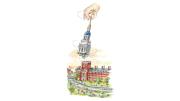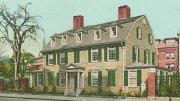1911
The Corporation proposes that needy boys entering the College from Cambridge high schools be exempted from paying tuition during their first year, and that summer-school fees be substantially reduced for Cambridge public-school teachers.
1926
In response to grumbles from alumni that the modern Harvard student is “too self-conscious to enjoy tomfoolery, too sophisticated to do anything that isn’t done,” the Bulletin shares a string of recent undergraduate antics, including a student who ate 45 eggs in 43 minutes.
1931
The Russian bells at Lowell House are rung for the first time, on Easter.
1936
Musing that much Harvard news turns up in daily newspapers, a Bulletin editorialist examines a Boston paper on an average winter day and finds “the ‘Harvard angle’ ” covered 13 times. Items include a Cambridge city councilor’s suggestion that the University make the city a tercentenary gift of $300,000—“on the grounds that ‘Harvard receives many benefits from the city and gives little in return’ ”—and the alleged infestation of the Yard by bookies who tempt students to “Back Ponies Freely.”
1941
In an effort to “ease the costs” of a Harvard education, the University has reduced room rates in the Houses, is applying to the National Youth Administration for funds for a student work-program, and has set up two committees to explore the possibilities of instituting a self-service system in House dining halls to cut board rates.
1966
To protest new Radcliffe policies that require most women to live on campus, a junior runs a prank classified in the Crimson: “One-year marriage? Seems to be the only way for a Cliffie to get out of the dorm.” Many men, taking her seriously, flood the Crimson with letters.
1991
More than 1,200 people attend a day-long symposium on the medical significance of meditation practices co-sponsored by the Mind/Body Institute of New England Deaconess Hospital and Harvard. The Dalai Lama delivers the keynote address.
2011
President Drew Faust and U.S. Secretary of the Navy Ray Mabus Jr., J.D. ’75, sign an agreement clearing the way for the Naval Reserve Officers Training Corps to return to Harvard once the congressional repeal (enacted three months earlier) of “Don’t Ask, Don’t Tell” takes effect.









